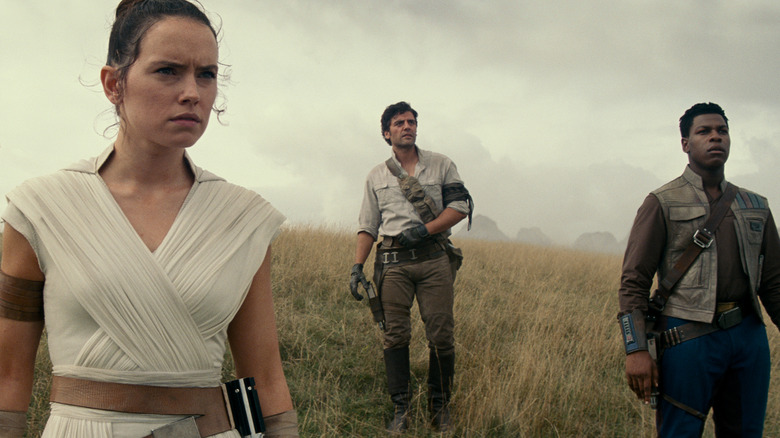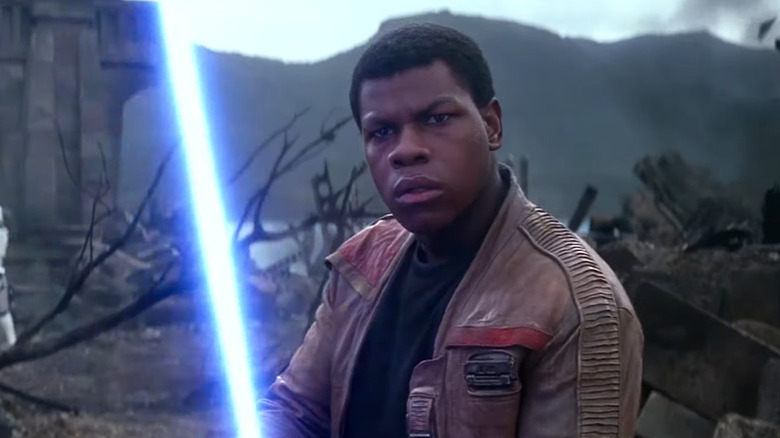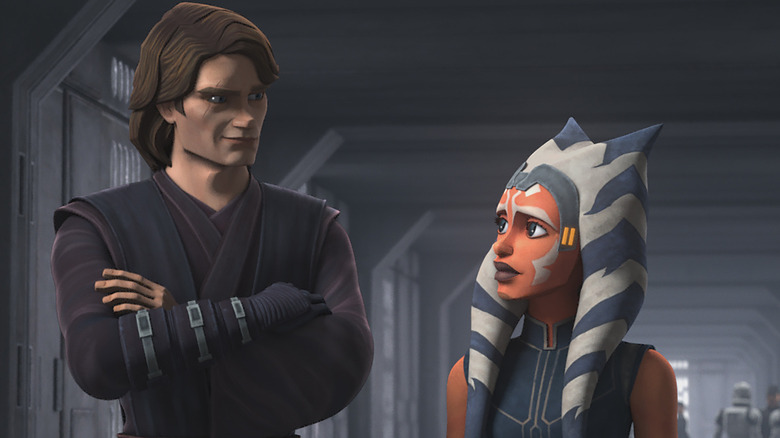An Upcoming Star Wars Book Can Begin The Redemption Of The Sequel Trilogy Era
Nearly six years following the release of "Star Wars: The Rise of Skywalker," Lucasfilm has mostly avoided exploring the polarizing Sequel Trilogy era. Every possible discussion — both healthy and unhealthy — regarding the pros and cons of J.J. Abrams and Rian Johnson's contributions to the Skywalker Saga remains some of the more exhausting discourses within geek culture, and to re-litigate these debates would be beating a dead tauntaun. However, the aspect of the Sequel Trilogy that fans can agree upon is that Finn (John Boyega) was wasted.
Following his phenomenal introduction in "Star Wars: The Force Awakens" as the male lead hero, Finn's storyline was subject to a bad game of telephone between Rian Johnson and J.J. Abrams, both of whom had differing visions for where the character's development should go. John Boyega has been vocal about his frustration regarding Finn's diminishing character trajectory, and what is particularly ironic is that the Sequel Trilogy leaves his fate with some exciting potential if Lucasfilm were interested in bringing him back. If only the potential had been fulfilled in the trilogy itself.
Lucasfilm is looking to return to the Sequel Trilogy era with Shawn Levy's upcoming film, "Star Wars: Starfighter," with Academy Award-nominee Ryan Gosling as the lead. Set five years after the events of "The Rise of Skywalker," the film will finally explore the future of the galaxy far, far away. But fans eager for content post-"The Rise of Skywalker" do not have to wait much longer, because Penguin Random House announced a new book written by Kwame Mbalia titled "Star Wars: The Last Order," which will involve the Resistance rescuing a ship of young prospects kidnapped by the First Order. Finn and Jannah (Naomi Ackie) then embark on a mission to bring the First Order officer responsible to justice while also dealing with the trauma of their stolen childhoods. This exciting premise for the first novel set after the conclusion of the Skywalker Saga can help set the stage for the redemption of the Sequel Trilogy era.
Where Finn's story went wrong
It is hard to believe that this December, it will be 10 years since the release of "Star Wars: The Force Awakens." Looking back at over a decade of Disney's ownership of Lucasfilm, it is easy to forget that despite the wretched hive of scum and villainy that certain segments of the "Star Wars" can be, fewer films were more anticipated than the long-awaited sequel to "Return of the Jedi." Yes, much can be said about how the seventh film in the Skywalker Saga borrowed heavily from "A New Hope," but there is no denying that the J.J. Abrams-directed film set up an exciting foundation for Episodes VIII and IX. In particular, one of the film's most original characters was its deuteragonist Finn, a runaway Stormtrooper who was set up for potential greatness. He held his own with a Lightsaber despite no Force training, and his past life as an indoctrinated child soldier in the First Order could lead to one of the most ambitious and exciting stories of the Sequel Trilogy.
Alas, Finn's storyline in the next two "Star Wars" sequels failed to live up to his narrative potential and John Boyega's acting talents. In a film already notorious for being perhaps the most divisive franchise blockbuster of the century, Rian Johnson's "The Last Jedi" followed Finn's storyline with an underwhelming mission that lacked any of the momentum set up in "The Force Awakens." Sure, Finn's Stormtrooper background was addressed during his big mission with Rose Tico (Kelly Marie Tran) and DJ (Benicio del Toro), but besides a pretty standard duel with Captain Phasma (Gwendoline Christie), the only compelling drama and development to be found within Finn's First Order roots in this sequel was in a scene where he exposes Phasma's cowardice to a group of troubled Stormtroopers, potentially teasing a broader Stormtrooper rebellion arc for the next film. Unfortunately, this scene that added depth to both Finn, Phasma, and the faceless Stormtroopers was deleted from the film.
Despite Finn's underwhelming arc in "The Last Jedi," the "Star Wars" sequel trilogy still had one more film to conclude his story satisfyingly. J.J. Abrams returned to helm "The Rise of Skywalker," which ultimately disappointed critics and audiences alike. Despite Abrams' efforts to reintroduce elements of Finn he set up in "The Force Awakens," including further exploring his Stormtrooper background and confirming his Force sensitivity, it was too little, too late. Sure, Finn meets Jannah, a fellow Stormtrooper who mutinied against the First Order, and the duo lead a mission during the film's climax, but the film fails to further explore this compelling dynamic in depth, leaving the inherently enthralling notion of a larger Stormtrooper rebellion unexplored.
How expanded canon material helps redeem divisive Star Wars eras
With the announcement of "Star Wars: The Last Order," it appears that the story group at Lucasfilm is taking long-overdue steps to give the Sequel Trilogy era the expanded material it desperately needs to build a warmer reputation among the fandom. Younger "Star Wars" fans may not realize this today, but the Prequel Trilogy was heavily reviled by fans at the time. Sure, audiences flocked to theaters last month for the 20th anniversary re-release of "Revenge of the Sith," which admittedly, remains the most beloved film of that trilogy, but many hated George Lucas' prequels at the time – so much so, a documentary about fans' backlash to those films, titled "The People vs. George Lucas" was made.
However, part of what helped redeem the Prequel Trilogy in the eyes of the fandom was "The Clone Wars." The series, which explored the titular wars before Order 66 and the rise of the Empire, gave fans countless hours of new worlds, stronger-written stories, and new characters that have become "Star Wars" icons in their own right. More recently, "Andor" season 2, which may showcase the very best arc of "Star Wars" storytelling since 1980, dropped on Disney+. The series, which is a prequel to "Rogue One," which itself is a prequel to "A New Hope," has enriched an already-beloved era of the galaxy to such incredible heights.
Whether through television series, video games, comics, or books, the "Star Wars" universe will always have opportunities to expand the canon of what George Lucas first introduced audiences to in 1977. Sure, "Starfighter" looks to be the first film to explore a post-"The Rise of Skywalker" galaxy, but "The Last Order" can be the first project that can help lead to a Prequel Trilogy-esque positive reassessment of the Sequel Trilogy era. And given that the book will focus on Finn, who might as well be the poster child of wasted potential in any film franchise, we could be taking our first steps into a larger world where the best stories of our surviving Resistance heroes will finally be told.
"Star Wars: The Last Order" will be released in bookstores on October 21, 2025.


